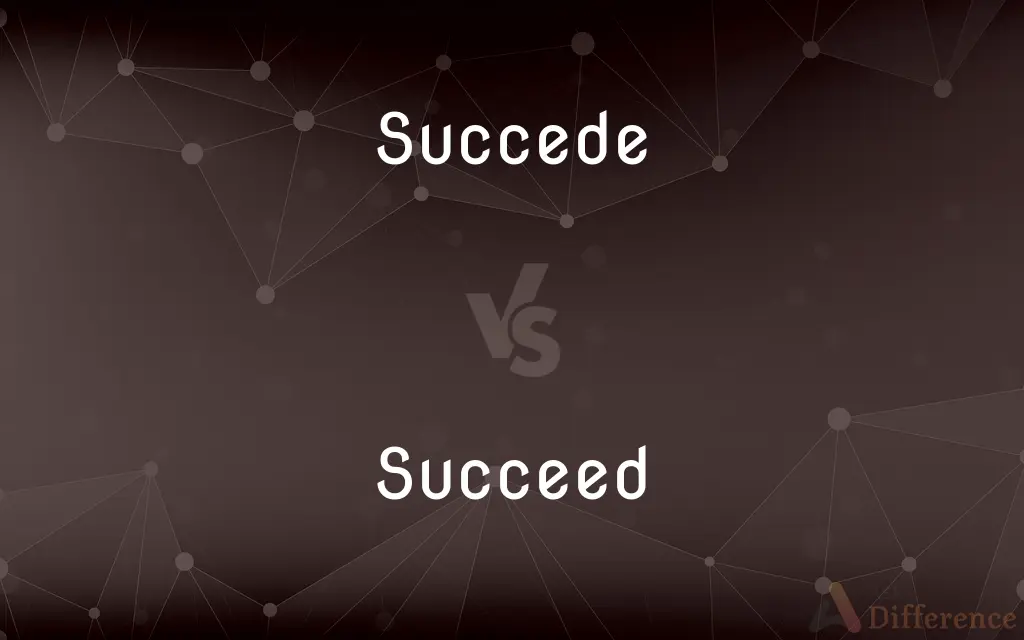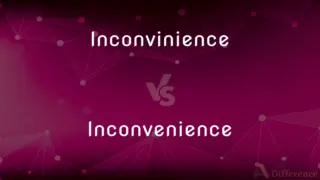Succede vs. Succeed — Which is Correct Spelling?
Edited by Tayyaba Rehman — By Fiza Rafique — Updated on March 19, 2024
Succede is the incorrect spelling. Succeed is the correct spelling and refers to achieving a desired result or outcome.

Table of Contents
Which is correct: Succede or Succeed
How to spell Succeed?

Succede
Incorrect Spelling

Succeed
Correct Spelling
ADVERTISEMENT
Key Differences
Recall "success," which has two "c"s and two "s"s, just like succeed.
Visualize succeed as "suc-CEED," emphasizing the strong ending.
Remember the phrase: "To succeed, you need double effort," mirroring the double "c" and "s."
Pair it with related words like "precede" which also have "ceed" at the end.
Think of "seed" which grows into success, found in the ending of succeed.
ADVERTISEMENT
How Do You Spell Succeed Correctly?
Incorrect: Many startups fail to succede in their first year.
Correct: Many startups fail to succeed in their first year.
Incorrect: He worked hard to succede in his career.
Correct: He worked hard to succeed in his career.
Incorrect: She hopes to succede in her exams this semester.
Correct: She hopes to succeed in her exams this semester.
Incorrect: They have all the resources they need to succede.
Correct: They have all the resources they need to succeed.
Incorrect: It's not easy to succede in such a competitive industry.
Correct: It's not easy to succeed in such a competitive industry.
Succeed Definitions
Succeed means to achieve a desired objective or result.
She worked hard and managed to succeed.
Succeed may refer to turning out well or being effective.
The plan succeeded beyond their expectations.
Succeed can also refer to coming after something in sequence.
Winter succeeds autumn.
Succeed means to follow and replace another by inheritance, election, or appointment.
The prince will succeed to the throne.
To come next in time or order
She fell sick, and what succeeded was an outpouring of concern from her fans.
To replace another in office or position
The prince succeeded to the throne.
To accomplish something desired or intended
"Success is counted sweetest / By those who ne'er succeed" (Emily Dickinson).
(Obsolete) To pass to a person by way of inheritance.
To come after (something) in time or order; follow
Winter succeeds autumn.
To come after and take the place of
The heir succeeded the king.
(transitive) To follow something in sequence or time.
Autumn succeeds summer.
(transitive) To replace or supplant someone in order vis-à-vis an office, position, or title.
The king's eldest son succeeds his father on the throne.
After a contentious election, Jones succeeded Smith as president of the republic.
Take the place of
(intransitive) To come after or follow; to be subsequent or consequent; often with to.
(intransitive) To come in the place of another person, thing, or event; to come next in the usual, natural, or prescribed course of things; to follow; hence, to come next in the possession of anything; often with to.
Following the death of his mother, he succeeded to the throne.
So, if the issue of the elder son succeed before the younger, the crown (or: property) falls to me.
(intransitive) To ascend the throne after the removal or death of the occupant.
Princess Buttercup succeeded to the throne as queen after King Willoughby died.
(intransitive) To prevail in obtaining an intended objective or accomplishment; to prosper as a result or conclusion of a particular effort.
The persecution of any righteous practice has never succeeded in the face of history; in fact, it can expedite the collapse of the persecutory regime.
She succeeded in her efforts to repair the tank.
(intransitive) To prosper or attain success and beneficial results in general.
Voted most likely to succeed
To turn out, fare, do (well or ill).
(transitive) To support; to prosper; to promote or give success to.
(intransitive) To descend, as an estate or an heirloom, in the same family; to devolve; often with to.
To fall heir to; to inherit.
To go down or near with to.
To follow in order; to come next after; hence, to take the place of; as, the king's eldest son succeeds his father on the throne; autumn succeeds summer.
As he saw him nigh succeed.
To come after; to be subsequent or consequent to; to follow; to pursue.
Destructive effects . . . succeeded the curse.
To support; to prosper; to promote.
Succeed my wish and second my design.
To come in the place of another person, thing, or event; to come next in the usual, natural, or prescribed course of things; to follow; hence, to come next in the possession of anything; - often with to.
If the father left only daughters, they equally succeeded to him in copartnership.
Enjoy till I returnShort pleasures; for long woes are to succeed!
To ascend the throne after the removal the death of the occupant.
No woman shall succeed in Salique land.
To descend, as an estate or an heirloom, in the same family; to devolve.
To obtain the object desired; to accomplish what is attempted or intended; to have a prosperous issue or termination; to be successful; as, he succeeded in his plans; his plans succeeded.
It is almost impossible for poets to succeed without ambition.
Spenser endeavored it in Shepherd's Kalendar; but neither will it succeed in English.
To go under cover.
Will you to the cooler cave succeed!
Attain success or reach a desired goal;
The enterprise succeeded
We succeeded in getting tickets to the show
She struggled to overcome her handicap and won
Be the successor (of);
Carter followed Ford
Will Charles succeed to the throne?
Succeed can signify prospering or thriving.
With dedication, you will surely succeed.
Succeed Meaning in a Sentence
To succeed, you must be willing to face challenges head-on.
The project will only succeed with everyone's cooperation.
She has the talent and determination to succeed.
He aims to succeed where others have failed.
Persistence is key to succeed in any endeavor.
You need a clear plan if you want to succeed.
Innovators are those who succeed by thinking outside the box.
To succeed in sports, physical fitness and mental toughness are essential.
You will succeed if you persevere and maintain a positive attitude.
It's rare to succeed on the first try, but don't give up.
He's trying to succeed in a very difficult field.
They hope to succeed in reducing pollution through new technology.
They are determined to succeed despite the obstacles.
Succeed Idioms & Phrases
To succeed in leaps and bounds
To achieve rapid success.
The startup succeeded in leaps and bounds, quickly becoming a market leader.
Succeed against all odds
To achieve success despite very low probability.
She managed to succeed against all odds and became a champion.
If at first you don't succeed, try, try again
Keep making efforts until you achieve success.
He finally solved the complex problem, living proof that if at first you don't succeed, try, try again.
Common Curiosities
Why is it called Succeed?
It's called succeed from the Latin 'succedere' meaning "come close after."
What is the root word of Succeed?
The root originates from the Latin word "succedere."
What is the verb form of Succeed?
The verb form is "succeed."
What is the pronunciation of Succeed?
It is pronounced as /səkˈsiːd/.
What is the singular form of Succeed?
The singular form is "succeed."
Which vowel is used before Succeed?
The vowel "e" is used before succeed.
Which preposition is used with Succeed?
"In" is often used, as in "succeed in an endeavor."
Is Succeed an adverb?
No, succeed is not an adverb.
What is the plural form of Succeed?
As a verb, succeed doesn’t have a plural form.
Which article is used with Succeed?
Both "a" and "the" can be used with succeed, but it largely depends on the context.
Is the word Succeed imperative?
It can be, e.g., "Succeed in your endeavors!"
What is another term for Succeed?
Achieve or prevail.
Which determiner is used with Succeed?
Any determiner like "this," "that," "my," or "a" can be used, depending on context.
Which conjunction is used with Succeed?
Any conjunction can be used with succeed depending on the context, like "and" or "but."
Is Succeed a negative or positive word?
Generally positive, as it often implies a favorable outcome.
Is Succeed a vowel or consonant?
Succeed is a word, not a single letter. It contains both vowels and consonants.
Is Succeed a collective noun?
No, it's not a collective noun.
Is the Succeed term a metaphor?
Not inherently, but it can be used metaphorically in some contexts.
Is the word “Succeed” a Direct object or an Indirect object?
It can be either, depending on the sentence.
How many syllables are in Succeed?
There are two syllables in succeed.
What is the opposite of Succeed?
Fail or falter.
Is Succeed an abstract noun?
No, it is primarily a verb.
Is Succeed a countable noun?
It's not typically used as a noun, but the related noun "success" is uncountable.
Is the word Succeed a gerund?
No, "succeeding" would be the gerund form.
How do we divide Succeed into syllables?
It divides as suc-ceed.
What is the first form of Succeed?
The first form (base form) is "succeed."
What is the third form of Succeed?
The third form (past participle) of the verb "succeed" is "succeeded."
What is the second form of Succeed?
The second form (past tense) of the verb "succeed" is "succeeded."
Is Succeed a noun or adjective?
Succeed is primarily a verb.
What is the stressed syllable in Succeed?
The second syllable, "ceed," is stressed.
What part of speech is Succeed?
Succeed is a verb.
How is Succeed used in a sentence?
"With perseverance, you will surely succeed."
Share Your Discovery

Previous Comparison
Highlight vs. Highlite
Next Comparison
Perfecter vs. PerfectorAuthor Spotlight
Written by
Fiza RafiqueFiza Rafique is a skilled content writer at AskDifference.com, where she meticulously refines and enhances written pieces. Drawing from her vast editorial expertise, Fiza ensures clarity, accuracy, and precision in every article. Passionate about language, she continually seeks to elevate the quality of content for readers worldwide.
Edited by
Tayyaba RehmanTayyaba Rehman is a distinguished writer, currently serving as a primary contributor to askdifference.com. As a researcher in semantics and etymology, Tayyaba's passion for the complexity of languages and their distinctions has found a perfect home on the platform. Tayyaba delves into the intricacies of language, distinguishing between commonly confused words and phrases, thereby providing clarity for readers worldwide.











































